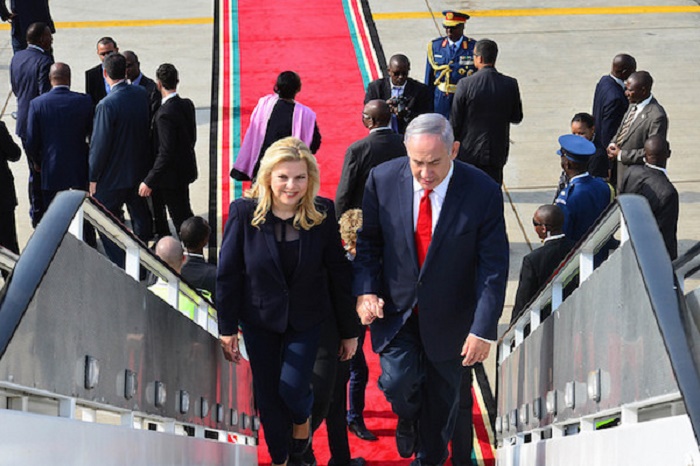Alwaght- The Israeli and Azerbaijani media in past few months set high on their agenda presenting reports highlighting a visit of the Israeli PM Benjamin Netanyahu to Azerbaijan. Netanyahu himself two weeks ago said he was arranging for his trip to Baku on December 13, igniting a heavy wave of news trumpeting in the two sides' media. It appears that he has well planned for a media campaign before his scheduled trip in a bid to paint it as a significant event in Azerbaijan, taking a different approach from the past when Tel Aviv leaders were trying to keep their ties with Caucasian nations secret.
Aside from propagandistic aspects of this visit, it is meant to seek some political, strategic, military, security, economic, energy, regional, and global goals, too.
Political goals: Collecting the outcomes of Azerbaijan’s “year of multiculturalism”: Tracking the news of the Israeli officials' visits to Azerbaijan and connections with Baku leaders throughout 2016 makes it crystal clear that Tel Aviv wants to imbue Caucasus and perhaps the world with the idea that Azerbaijan as a Shiite nation after the Israeli regime is the second to provide best living conditions for the Jewry, a sign of peaceful coexistence of the Muslims and the Jews. Influenced by the Israeli lobbies, the Azerbaijani government named 2016 the year of multiculturalism in the country, arranging events to honor the Jews and Zionists in Azerbaijan. Actually, Netanyahu's visit comes to harvest what the Israeli cultural organizations planted in Azerbaijan.
Political and strategic goals: Tel Aviv, which pursues the policy of the “alliance of the periphery”( or periphery doctrine) in a bid to make up for its isolation among the Muslim countries through getting toehold in countries out of the West Asia region, since Soviet Union’s collapse put a premium on Azerbaijan in its periphery doctrine. But even opening its embassy in Baku in 1992 did not eliminate Tel Aviv’s security concerns in the majorly Muslim country. After all, the Israelis opened their embassy in a country in which anti-Israeli sentiments vigorously existed. Even when Netanyahu visited Baku in 1997, he did so secretly. He immediately left Azerbaijan after night meeting with Heydar Aliyev, former Azerbaijan president. But now he travels to Baku in broad daylight. It can be noted that Netanyahu wants to check achievements of Tel Aviv’s periphery doctrine in the sensitive Caucasus, close to Iranian borders.
Military and security goals: Israeli seeks to promote itself as second-largest military actor in Transcaucasia: Tel Aviv for two and half a decade followed a policy of infiltration into Caucasus', particularly Azerbaijan’s, military and security infrastructures. This policy was even accelerated after Ilham Aliyev took office as president. The Israelis penetrated in the security foundations of Azerbaijan, selling Baku arms and partnering it in many military projects. Tel Aviv set up drone production factory in Azerbaijan, and at the same time it contributed to security provision of some political and sports events in Azerbaijan, including Baku 2015 European games and 2012 Eurovision song contest. Of course, Netanyahu during his visit seeks firming up Tel Aviv’s position as the second major actor in Caucasus' security equations after Russia.
Economic and energy goals: Guaranteeing lasting oil inflow to the Israeli regime from Azerbaijan and entry to gas exportation hub: In past two decades, the Israeli regime has been a purchaser of all or a major part of Azerbaijan’s exported oil. This relation imposes Tel Aviv on Baku as an exclusive economic partner. This partnership allows the Israeli regime to connect its gas to a pipeline that supplies Azerbaijan’s gas to Europe. The Israeli PM seeks taking advantage of TANAP gas pipeline which Baku tries to promote as a key and global project.
Regional and global goals: Exploiting Iran nuclear deal's positive influences on Caucasus: Certainly, the nuclear deal with Tehran has affected Caucasus relations with Iran. Azerbaijan government began getting close to Iran. At the same time, Baku, paradoxically, emphasized that it is the closest partner of Tel Aviv in the region. Although the Israelis use Baku to promote a sham coexistence with the Iranians in Azerbaijan, they take anti-Iranian security steps from Azerbaijan’s soil.
As part of its rivalry with Tehran, Tel Aviv wants to push its rival out of Caucasus, a goal seen obviously in the Israeli interventions in the Iran-Azerbaijan relations. Through pressures, the Israelis managed to provoke the Azerbaijani politicians against Iran. For example Azerbaijan's officials warned that an expected visit of Iran’s president to Armenia, Azerbaijan's adversary, could damage Baku-Tehran ties.



























